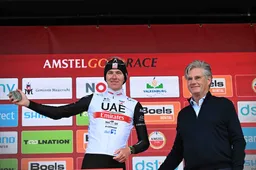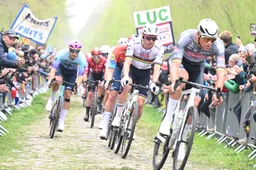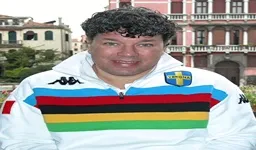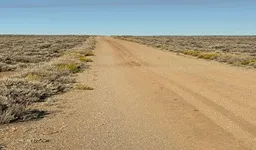Team manager of Visma | Lease a Bike women shares secret winning race plan for Paris-Roubaix: "There's one thing we knew for sure"
Cycling
Rutger Tijssen was a happy man on Saturday afternoon in Roubaix. The team manager and director of the Visma | Lease a Bike women’s squad watched his riders execute an almost flawless race, earning a well-deserved victory in the Hell of the North, the team’s first Monument win in a long time. “Pauline Ferrand-Prévot has an incredible hunger. In everything she does,” said Tijssen.
Tijssen, a former speed skater and skating coach before switching to cycling in 2022, had nothing but praise for his riders after their performance on the cobbles of northern France. “What happened was exactly the race plan. We needed to be in a position where we were up the road and others had to chase us. The riders had to sense that moment themselves, that's the essence of team strategy. And that’s what we stand for right now.”
And that also meant a champion like Marianne Vos, who would love to add this race to her palmarès, staying back to protect Ferrand-Prévot’s breakaway. “In the end, you’re a team, and Marianne did exactly what a great champion does: give up her own chance to win in order to secure a certain victory for the team,” Tijssen said post-race at the team bus, speaking to gathered Dutch media.
With that plan, SD Worx-Protime’s challenge, led by Lotte Kopecky and Lorena Wiebes, was effectively neutralized. “Not just SD Worx, but also Trek and other teams, we analyzed them, their strengths and weaknesses. One thing we knew for sure: we didn’t want to go to the velodrome with Lorena. That Kopecky sacrificed herself, that was exactly what we hoped for. They had to make a move.”
Read more below the photo!

Tijssen impressed with Ferrand-Prévot: "Winning: she devours that"
That Ferrand-Prévot—even after being ill—was able to contend for the win didn’t really surprise team manager Rutger Tijssen all that much. “Pauline has been focusing on the road since October, and when you see what she does and how she approaches everything, she does it all really well. But yeah, you know what it is? Talent. That makes everything easier,” he pointed out. “Hope doesn’t get you that far. I did expect her to perform well, because we knew her data and so on.”
“This race was pretty high on her wish list, because now she doesn’t have to look at Dylan’s cobblestone anymore,” Tijssen added with a grin, referring to Ferrand-Prévot’s partner, Dylan van Baarle. “She wins as a Frenchwoman on home soil, but above all it’s that unbelievable hunger to win. In everything she does: she devours it. And I bet she’s going to want to do the same in the Tour.”
Read more below the photo!

"The Gravaa system works, No need for the Visma | Lease a Bike man to call me for that"
And finally: the Gravaa system does work, that much is clear. “For those paying close attention, it was obvious we were going to use it. We were convinced of it, otherwise, we wouldn’t have raced with it. That much is clear,” said Rutger Tijssen. A good example for the men’s team? “Whether they’ll adopt it, that’s not for me to say. They make their own choices, and we’re not about to tell them what to do. That would be a bit odd. But hey, they don’t need to call us anymore to see that it worked,” Tijssen added with a grin.
There’s been quite a bit of buzz around the Gravaa tire pressure system. Most cycling experts already agree that the Dutch team has a serious technological edge. Thijs Zonneveld called it a “weapon,” and Sep Vanmarcke, who had the chance to test it extensively, saw it as an “undeniable advantage.” But he also acknowledged the downsides, most notably, the time it takes to reinflate the tires. That, according to Vanmarcke, is exactly where rivals can strike: “If I were a competitor, I’d attack Van Aert right after a cobblestone section, because his tires would still be softer than yours,” he remarked.
Read also
IDL-productions

Tadej Pogacar responds to alternate take on his crash in Roubaix: "It's good that you mention it…"

Based on what Pogacar told teammate Vermeersch, it’s clear that Roubaix won’t be his downfall

Preview Amstel Gold Race 2025 | Pogacar vs. van Aert, with Pidcock, Nys, Evenepoel & others in the mix

Kubis supported by Unibet Tietema Rockets after going through hell in Trouée d'Arenberg, while Stockman enjoyed riding behind van der Poel and Pogacar

Preview Brabantse Pijl 2025 | Evenepoel’s comeback—but also van Aert, Pidcock, a strong UAE team, and many more!
Latest Cycling News

Dead last in Roubaix! Joseph Pidcock finishes nearly an hour behind van der Poel in Roubaix: "Not risking my life for this"

🎥 Perpetrator in van der Poel's 'attempted manslaughter' case first denies, then expresses 'deep regret and shame'

Tadej Pogacar responds to alternate take on his crash in Roubaix: "It's good that you mention it…"

Preview Tour of Limburg 2025 | Can Girmay score his first win of the season in Belgium?

Pogacar disappoints Strava fans after "one of the highest power outputs I’ve ever seen" and enjoys Roubaix shower after crash
Popular Cycling News

Dead last in Roubaix! Joseph Pidcock finishes nearly an hour behind van der Poel in Roubaix: "Not risking my life for this"

Hefty fine (2000 Swiss Francs!) for Van der Poel and Alpecin-Deceuninck after illegal feeding incident in Paris Roubaix! 🤯🤔

🎥 Perpetrator in van der Poel's 'attempted manslaughter' case first denies, then expresses 'deep regret and shame'

Partially blind, partially deaf: Mathieu van der Poel won Paris-Roubaix without a functioning wattage meter or race radio

Pogacar disappoints Strava fans after "one of the highest power outputs I’ve ever seen" and enjoys Roubaix shower after crash
Latest Comments
- Such negative comments that are truly inappropriate and actually ridiculous. He sounds like an old man, bitter that he can't race anymore. Why can't he just be gracious? Or just shut up. Instead of howling for attention, in such a rude manner. Must be Dementia creeping in. We are all living in the Now. Records are there, and some are being broken, some are unapproachable. If he doesn't like it, and it makes him sick, maybe he ought start watching some other sport. Don't want the old mans health to be upset.
 reemmo031-03-2025
reemmo031-03-2025 - Roger De Vlaeminck inspires me to create a new beer: "Bitter Old Twat Belgian".JackInhof31-03-2025
- Shoot, I'll ride it for 1/10 of what his pay for that day is😅Veganpotter30-03-2025
- What is this? The Lance Armstrong daily cheaters channel? I could care less about Johan and Lance the seven times cheater. Greg Lemond was right all along, Why don't you write about that instead of these two knuckleheads.velodrone28-03-2025
- Are we all doomed to hear from Lance Armstrong and Johan bruneel until the end of time? It's not enough the stain they left on cycling? Do we have to see that shadow forever?bigyakman26-03-2025
- I am not sure if it is the hardest to win. In Flanders and Roubaix well before the finish the Peleton will be decimated and the race will normally be won by the best rider of the day or maybe 2nd or 3rd in case of a mechanical or unlucky break especially in case of Roubaix. In San Remo just before the finish there will still be several riders in contention and they are hard to ditch. For the best riders it is a race hard to win since it is not so selective. But if you are not a top 5 rider but still a top 10 rider this race is your best change to win. You will see more Milan San remo Winners with only 1 monument win than any other monumentsJoostmehrtens19-03-2025
- "fap fap fap oh Lance oh oh OHHHHHHH" again. Does he pay you to dredge up people with nice things to say about him? He was an giant a$$hole to people. It is a fact. Whatever his contrition about the doping, he is unapologetic about being a giant a$$hole to people. (Why yes, I do only login to complain. *I* am however only a giant a$$hole to people who laud giant a$$holes.)ericjensenridesbikes25-02-2025
- Remco is still very young. And injuries can absolutely keep you from overdoing it and getting worse. The recent Remco accident didn't keep him from being able to ride a recumbent inside. Wout's knee is a different story thoughVeganpotter23-01-2025
- Van der Poel style is winning by a half a lap and leading the race from the end of the second lap.
 Barnes127420-01-2025
Barnes127420-01-2025 - If she thinks talent alone will put her there she will not see many podium finishes much less a GC finish.....work as a team utilizing tactics to consistently be at the top.Germanrazor10-01-2025


